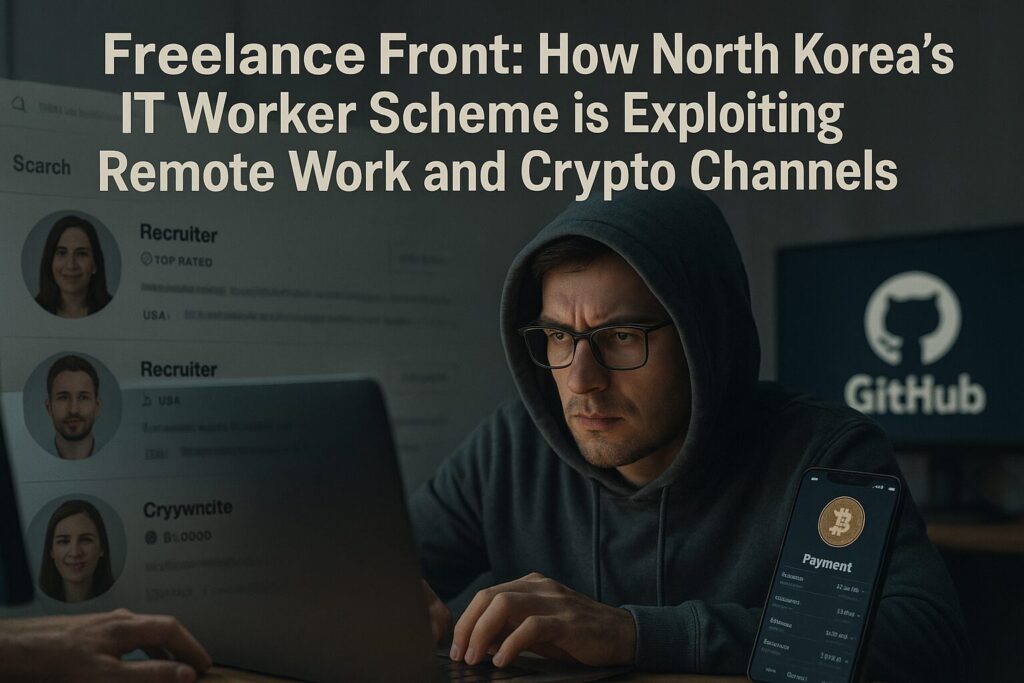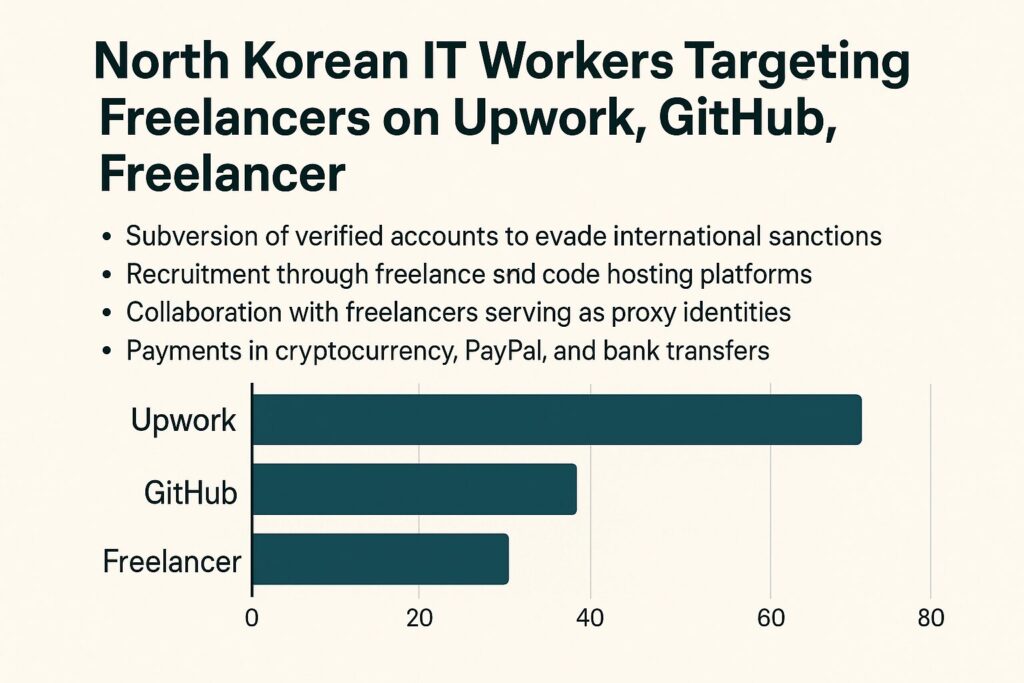
Main Points :
- North Korean IT operatives are targeting global freelancing platforms (e.g., Upwork, Freelancer) and code‐hosting platforms (e.g., GitHub) by posing as recruiters or legitimate freelancers.
- They leverage authenticated freelancer accounts (stolen or commandeered) to bypass geographic filters, identity verification, and VPN detection—thereby evading international sanctions.
- The scheme recruits freelancers as identity proxies, using them to obtain remote contracts, bank accounts, and cryptocurrency payments on behalf of the North Korean regime.
- Targeted regions include the U.S., Europe and parts of Asia—especially markets such as Ukraine and the Philippines, where “high‐pay remote job” offers attract low‐income or socially vulnerable individuals.
- Payment channels include cryptocurrency, PayPal, and traditional bank transfers—thus bridging digital‐asset flows and conventional finance.
- Recent developments show intensified regulatory and intelligence attention: governments have issued advisories and taken enforcement actions against such schemes.
- For crypto/blockchain practitioners and new digital-asset seekers, the scheme illustrates how remote work, identity fraud and crypto flows intersect—and highlights a latent risk environment (both as a threat vector and as a domain of opportunity).
1. The Mechanics of the Scheme

The article begins by reporting that North Korean IT operatives infiltrate freelancing platforms such as Upwork, Freelancer, and code collaboration platforms like GitHub. They typically pose as recruiters contacting verified freelancers. Once a freelancer responds, the operative shifts the interaction to encrypted channels such as Telegram or Discord and instructs the freelancer in setting up remote-access-software, passing identity verification, and controlling accounts. The operative may take over a verified account or use it as a conduit for contract work.
Crucially, by using a verified freelancer account (often belonging to a real person unbeknownst to them), the operatives bypass geofencing or identity filters which ordinarily block sanctioned groups. According to a researcher, using verified ID allows them to circumvent geolocation filters, identity checks and VPN‐detection systems. The process allows them to apply for remote IT jobs, do the work, and receive pay from unwitting clients.
From the perspective of the North Korean regime, this is attractive because each contract performed by a freelancer yields remuneration that can be diverted to the regime—through crypto channels or bank transfers—and thereby supports sanction-evading funding of arms or WMD programs. The referenced article highlights that the modus operandi includes recruiting freelancers as “remote IT identity proxies” for contract work and bank account attainment.
2. Payment Flows and Crypto Intersection
An important dimension is the way payments are collected. The article notes that payments are made via cryptocurrency, PayPal or bank transfer mechanisms. In one confirmed case, a North Korean IT operative used a fraudulent Upwork account registered under a U.S. architect based in Illinois. The payment then flowed via these channels. This illustrates how the scheme bridges remote work, identity fraud and crypto/fintech settlement flows.
For the crypto/blockchain audience, this is a key risk vector: remote work becomes a feeder channel into digital asset flows. Moreover, as the regime uses cryptocurrency for cross-border transfers and evasion of financial sanctions, the freelancing scheme yields both contract revenue and crypto conversion opportunities. This highlights a broader theme: the convergence of remote work platforms and digital-asset infrastructures creates new vulnerabilities and revenue streams for adversarial actors.
3. Target Regions, Social Engineering and Platform Abuse
The article emphasises that the operations run globally, with high activity in the U.S., Europe and Asia. Notably, Ukraine and the Philippines were flagged as regions where job adverts are frequent. The reason: these markets include economically vulnerable populations for whom “high income remote jobs” are appealing. This translates into a large pool of potential unwitting participants.
The operative’s method is heavily social engineering-based: contacting job seekers, presenting remote IT job offers, shifting to encrypted channels, instructing them in credential handing or remote access software. The misuse of freelancing and developer platforms (Upwork, Freelancer, GitHub) is core. The shift to second channels (Telegram/Discord) also indicates evasion of platform monitoring.
4. Sanctions Evasion and Geopolitical Implications
From a regulatory and strategic viewpoint, the scheme is significant because it is a hybrid: combining labour market manipulation, identity fraud, remote work, fintech payments and crypto flows to circumvent international sanctions on North Korea (DPRK). Government reports show that the DPRK’s cyber and IT-worker operations are used to generate foreign currency to fund its weapons and ballistic missile programmes.
Advisories from multiple jurisdictions warn that employing or paying DPRK IT workers—even unknowingly—may breach sanctions. For instance, in Canada:
“Employing these individuals could result in legal consequences … and indirectly contribute to North Korea’s weapons of mass destruction and ballistic missile programs”
In Australia a guidance note similarly warns that payments to DPRK IT workers violate UN & Australian sanctions laws.
From the crypto and blockchain ecosystem’s perspective, this means that digital-asset infrastructure may intersect with state‐sponsored illicit finance and sanctions exposure.
5. Recent Developments and Trend Highlights
Beyond the article’s immediate content, recent trends reinforce and expand the threat horizon:
- A joint statement by the U.S., Japan and South Korea noted their continuing unified efforts against DPRK IT-worker threats.
- An advisory from the UK’s sanctions authority (OFSI) states: “It is almost certain that DPRK IT workers are currently using online freelance platforms or job marketplaces to advertise services to secure employment with UK firms.”
- Investigative reports show that DPRK operatives are now posting fake job adverts in the cryptocurrency sector to steal digital assets from applicants; for example, fake “crypto job” listings on social media pointing to malicious wallet-draining sites.
- Enforcement actions: On June 30 2025 the United States Department of Justice announced arrests and indictments linked to a DPRK remote IT worker scheme that targeted over 100 U.S. companies, stole at least ~$900,000 in cryptocurrency and led to multi-million-dollar remediation costs.
- As recently as Nov 4 2025, the U.S. Treasury imposed sanctions on North Korean bankers and entities accused of laundering more than $3 billion in digital assets largely from DPRK cyber operations.
For our audience—crypto investors, blockchain practitioners and new digital-asset seekers—these developments underscore that remote-work freelancing platforms are now part of the sanctions-evasion and digital‐asset threat surface. This also implies that digital-asset firms, payment providers, AML/CFT compliance teams, and token issuers need to factor such hybrid schemes into their risk assessment.
6. Implications for New Crypto-Assets and Blockchain Applications
From a practical standpoint, what does this mean for you, as someone looking at new crypto assets, income opportunities and blockchain application use-cases?
- Risk awareness: If you are launching a token, offering freelance smart-contract work, or integrating remote developers in your ecosystem, you must ensure that your onboarding processes, KYC/identity verification and payment settlement options do not inadvertently facilitate actors who may be proxies for sanctioned states.
- Payment settlement channels: Blockchain applications that mix freelance payments with crypto settlement need to clearly segment and monitor workflows, avoid mixing unknown freelancers with high-value payments without identity validation.
- New income generation: On the flip side, the remote work paradigm is here to stay. You may explore legitimate remote-developer marketplaces, smart-contract audit freelancing, and blockchain-platform gigs—but need to do so with controls around identity, location, wallet verification and fraud prevention.
- Innovation in control tools: There is an opportunity for smart-contract tools or decentralized identity solutions that validate freelancers’ identities, track verification or restrict settlement flows according to geolocation/AML-rules. This aligns with the “autonomous trust tender” side of your Two-Extremes Model (decentralised value flows) but must be anchored with identity/credential assurance (asset-backed representation).
- Due-diligence for token launches: If your upcoming ICO or token presale uses external dev resources, you may wish to build in clauses that prohibit proxies or identity rent-outs, monitor for unusual wallet patterns, include frequent audit and wallet-traceability requirements.
7. Summary and Take-Home Messages
In summary: the scheme detailed in the referenced article is not just an isolated hacking incident—it represents a sophisticated, state-backed exploitation of remote work, identity fraud, freelancing platforms and digital-asset settlement flows. For readers focused on new crypto assets, income opportunities and practical blockchain applications, the takeaway is twofold:
- First, as opportunities: the remote/crypto economy continues to expand and opens new doors for legitimate income—smart-contract auditors, remote blockchain developers, decentralized finance dev gigs.
- Second, as risks: the intersection of remote freelancing platforms + crypto payments + identity fraud is a growing threat surface. Being aware of schemes such as DPRK’s remote-IT worker programme helps you build stronger controls, select trusted freelancers, monitor payment flows and ensure compliance.
As you build your own blockchain‐based systems (e.g., remote development for your token project, freelance audits, or payment settlement frameworks), embedding identity verification, wallet traceability and payment-screening mechanisms will protect you from becoming an unwitting conduit for illicit flows.

